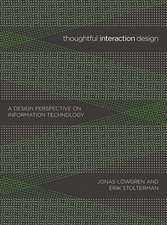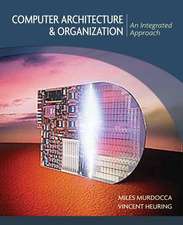Euro-Par’98 Parallel Processing: 4th International Euro-Par Conference Southampton, UK, September 1–4, 1998 Proceedings: Lecture Notes in Computer Science, cartea 1470
Editat de David Pritchard, Jeff Reeveen Limba Engleză Paperback – 19 aug 1998
The Euro-Par'98 conference is organized in initially 23 workshops addressing all current topics in parallel processing ranging from hardware via software and algorithms to applications. The book presents a total of 134 revised papers selected from a total of 238 submissions from 33 countries. The selection of the papers is based on more than 850 individual reviews. The book presents the state of the art in parallel processing research and development.
Din seria Lecture Notes in Computer Science
- 20%
 Preț: 1061.55 lei
Preț: 1061.55 lei - 20%
 Preț: 340.32 lei
Preț: 340.32 lei - 20%
 Preț: 341.95 lei
Preț: 341.95 lei - 20%
 Preț: 453.32 lei
Preț: 453.32 lei - 20%
 Preț: 238.01 lei
Preț: 238.01 lei - 20%
 Preț: 340.32 lei
Preț: 340.32 lei - 20%
 Preț: 438.69 lei
Preț: 438.69 lei -
 Preț: 449.57 lei
Preț: 449.57 lei - 20%
 Preț: 343.62 lei
Preț: 343.62 lei - 20%
 Preț: 148.66 lei
Preț: 148.66 lei - 20%
 Preț: 310.26 lei
Preț: 310.26 lei - 20%
 Preț: 256.27 lei
Preț: 256.27 lei - 20%
 Preț: 645.28 lei
Preț: 645.28 lei - 17%
 Preț: 427.22 lei
Preț: 427.22 lei - 20%
 Preț: 655.02 lei
Preț: 655.02 lei - 20%
 Preț: 307.71 lei
Preț: 307.71 lei - 20%
 Preț: 1075.26 lei
Preț: 1075.26 lei - 20%
 Preț: 591.51 lei
Preț: 591.51 lei -
 Preț: 381.21 lei
Preț: 381.21 lei - 20%
 Preț: 337.00 lei
Preț: 337.00 lei - 15%
 Preț: 438.59 lei
Preț: 438.59 lei - 20%
 Preț: 607.39 lei
Preț: 607.39 lei - 20%
 Preț: 538.29 lei
Preț: 538.29 lei -
 Preț: 389.48 lei
Preț: 389.48 lei - 20%
 Preț: 326.98 lei
Preț: 326.98 lei - 20%
 Preț: 1414.79 lei
Preț: 1414.79 lei - 20%
 Preț: 1024.44 lei
Preț: 1024.44 lei - 20%
 Preț: 579.30 lei
Preț: 579.30 lei - 20%
 Preț: 575.48 lei
Preț: 575.48 lei - 20%
 Preț: 583.40 lei
Preț: 583.40 lei - 20%
 Preț: 763.23 lei
Preț: 763.23 lei - 15%
 Preț: 580.46 lei
Preț: 580.46 lei - 17%
 Preț: 360.19 lei
Preț: 360.19 lei - 20%
 Preț: 504.57 lei
Preț: 504.57 lei - 20%
 Preț: 172.69 lei
Preț: 172.69 lei - 20%
 Preț: 369.12 lei
Preț: 369.12 lei - 20%
 Preț: 353.50 lei
Preț: 353.50 lei - 20%
 Preț: 585.88 lei
Preț: 585.88 lei -
 Preț: 410.88 lei
Preț: 410.88 lei - 20%
 Preț: 596.46 lei
Preț: 596.46 lei - 20%
 Preț: 763.23 lei
Preț: 763.23 lei - 20%
 Preț: 825.93 lei
Preț: 825.93 lei - 20%
 Preț: 649.49 lei
Preț: 649.49 lei - 20%
 Preț: 350.21 lei
Preț: 350.21 lei - 20%
 Preț: 309.90 lei
Preț: 309.90 lei - 20%
 Preț: 122.89 lei
Preț: 122.89 lei
Preț: 396.29 lei
Preț vechi: 495.37 lei
-20% Nou
Puncte Express: 594
Preț estimativ în valută:
75.84€ • 78.24$ • 64.19£
75.84€ • 78.24$ • 64.19£
Carte tipărită la comandă
Livrare economică 01-07 martie
Preluare comenzi: 021 569.72.76
Specificații
ISBN-13: 9783540649526
ISBN-10: 3540649522
Pagini: 1212
Ilustrații: XLIV, 1162 p. In 2 volumes, not available separately.
Dimensiuni: 155 x 235 x 64 mm
Ediția:1998
Editura: Springer Berlin, Heidelberg
Colecția Springer
Seria Lecture Notes in Computer Science
Locul publicării:Berlin, Heidelberg, Germany
ISBN-10: 3540649522
Pagini: 1212
Ilustrații: XLIV, 1162 p. In 2 volumes, not available separately.
Dimensiuni: 155 x 235 x 64 mm
Ediția:1998
Editura: Springer Berlin, Heidelberg
Colecția Springer
Seria Lecture Notes in Computer Science
Locul publicării:Berlin, Heidelberg, Germany
Public țintă
ResearchCuprins
Random number generation and simulation on vector and parallel computers.- Heterogeneous HPC environments.- Quantum cryptography on optical fiber networks.- Very distributed media stories: Presence, time, imagination.- HPcc as high performance commodity computing on Top of integrated Java, CORBA, COM and Web standards.- Workshop 1 Support tools and environments.- Process migration and fault tolerance of BSPlib programs running on networks of workstations.- A parallel-system design toolset for vision and image processing.- Achieving portability and efficiency through automatic optimisation: An investigation in parallel image processing.- EDPEPPS: A toolset for the design and performance evaluation of parallel applications.- Verifying a performance estimator for parallel DBMSs.- Generating parallel applications of spatial interaction models.- Performance measurement of interpreted programs.- Analysing an SQL application with a BSPlib call-graph profiling tool.- A graphical tool for the visualization and animation of communicating sequential processes.- A universal infrastructure for the run-time monitoring of parallel and distributed applications.- Net-dbx: A Java powered tool for interactive debugging of MPI programs across the internet.- Workshop 2+8 Performance evaluation and prediction.- Configurable load measurement in heterogeneous workstation clusters.- Exploiting spatial and temporal locality of accesses: A new hardware-based monitoring approach for DSM systems.- On the self-similar nature of workstations and WWW servers workload.- White-box benchmarking.- Cache misses prediction for high performance sparse algorithms.- h-Relation models for current standard parallel platforms.- Practical simulation of large-scale parallel programs and its performance analysis of the NAS Parallel Benchmarks.- Assessing LogP model parameters for the IBM-SP.- Communication pre-evaluation in HPF.- Modeling the communication behavior of distributed memory machines by genetic programming.- Representing and executing real-time systems.- Fixed priority scheduling of age constraint processes.- Workshop 03: Scheduling and load balancing.- Optimizing load balance and communication on parallel computers with distributed shared memory.- Performance analysis and portability of the PLUM load balancing system.- Experimental studies in load balancing.- On-line scheduling of parallelizable jobs.- On optimal k-iinear scheduling of tree-like task graphs for LogP-machines.- Static scheduling using task replication for LogP and BSP models.- Aspect ratio for mesh partitioning.- A competitive symmetrical transfer policy for load sharing.- Scheduling data-parallel computations on heterogeneous and time-shared environments.- A lower bound for dynamic scheduling of data parallel programs.- A general modular specification for distributed schedulers.- Feedback guided dynamic loop scheduling: Algorithms and experiments.- Load balancing for problems with good bisectors, and applicationsin finite element simulations.- An efficient strategy for task duplication in multiport message-passing systems.- Evaluation of process migration for parallel heterogeneous workstation clusters.- Using alternative schedules for fault tolerance in parallel programs on a network of workstations.- Dynamic and randomized load distribution in arbitrary networks.- Workshop 04 automatic parallelization and high-performance compilers.- Data distribution at run-time: Re-using execution plans.- Enhancing spatial locality via data layout optimizations.- Parallelization of unstructured mesh computations using data structure formalization.- Parallel constant propagation.- Optimization of SIMD programs with redundant computations.- Exploiting course grain parallelism from FORTRAN by mapping it to IF1.- A parallelization framework for recursive tree programs.- Optimal orthogonal tiling.- Enhancing the performance of autoscheduling in Distributed Shared Memory multiprocessors.- Workshop 05+15 distributed systems and databases.- Collection-intersect join algorithms for parallel object-oriented database systems.- Exploiting atomic broadcast in replicated databases.- The hardware/software balancing act for information retrieval on symmetric multiprocessors.- The enhancement of semijoin strategies in distributed query optimization.- Virtual time synchronization in distributed database systems using a cluster of workstations.- Load balancing and processor assignment statements.- Mutual exclusion between neighboring nodes in a tree that stabilizes using read/write atomicity.- Irreversible dynamos in tori.- MPI-GLUE: Interoperable high-performance MPI combining different vendor’s MPI worlds.- High performance protocols for clusters of commodity workstations.- Significance and uses of fine-grained synchronization relations.- A simple protocol to communicate channels over channels.- SciOS: Flexible operating system support for SCI clusters.- Indirect Reference Listing: A robust distributedGC.- Active ports: A performance-oriented operating system support to fast LAN communications.- Workshop 6+16+18 languages.- A tracing protocol for optimizing data parallel irregular computations.- Contribution to better handling of irregular problems in HPF2.- OpenMP and HPF: Integrating two paradigms.- Towards a Java environment for SPMD programming.- Language constructs and run-time system for parallel cellular programming.- Task parallel skeletons for irregularly structured problems.- Synchronizing communication primitives for a shared memory programming model.- Symbolic cost analysis and automatic data distribution for a skeleton-based language.- Optimising data-parallel programs using the BSP cost model.- A parallel multigrid skeleton using BSP.- Flattening trees.- Dynamic type information in process types.- Generation of distributed parallel Java programs.- An algebraic semantics for an abstract language with intra-object-concurrency.- An object-oriented framework for managingthe quality of service of distributed applications.- A data parallel java client-server architecture for data field computations over ?n.- Workshop 7+20 numerical and symbolic algorithms.- On the influence of the orthogonalization scheme on the parallel performance of GMRES.- A parallel solver for extreme eigenpairs.- Parallel solvers for large eigenvalue problems originating from Maxwell’s equations.- Waveform relaxation for second order differential equation y?’=f(x,y).- The parallelization of the incomplete LU factorization on AP1000.- An efficient parallel triangular inversion by Gauss elimination with sweeping.- Fault tolerant QR-decomposition algorithm and its parallel implementation.- Parallel sparse matrix computations using the PINEAPL library: A performance study.- Using a general-purpose numerical library to parallelize an industrial application: Design of high-performance lasers.- Fast parallel Hermite normal form computation of matrices over .- Optimising parallel logic programming systems for scalable machines.- Experiments with binding schemes in LOGFLOW.- Experimental implementation of parallel TRAM on massively parallel computer.- Parallel temporal tableaux.- Workshop 10+17+21+22 theory and algorithms for parallel computation.- BSP, LogP, and oblivious programs.- Parallel computation on interval graphs using PC clusters: Algorithms and experiments.- Adaptable distributed shared memory: A formal definition.- Parameterized parallel complexity.- Asynchronous (Time-Warp) versus synchronous (Event-Horizon) simulation time advance in BSP.- Scalable sharing methods can support a simple performance model.- Long operand arithmetic on instruction systolic computer architectures and its application in RSA cryptography.- Hardware cache optimization for parallel multimedia applications.- Parallel solutions of Simple Indexed Recurrence equations.- Scheduling Fork graphs under LogP with an unbounded number of processors.- A data layout strategy for parallel web servers.- ViPIOS: The Vienna Parallel Input/Output System.- A performance study of two-phase I/O.- Workshop 13+14 architectures and networks.- Predictable communication on unpredictable networks: Implementing BSP over TCP/IP.- Adaptive routing based on deadlock recovery.- On the optimal network for multicomputer: Torus or hypercube?.- Constant thinning protocol for routing h-relations in complete networks.- NAS Integer sort on multi-threaded shared memory machines.- Analysing a multistreamed superscalar speculative instruction fetch mechanism.- Design of processor arrays for real-time applications.- Interval routing & Layered Cross Product: Compact routing schemes for butterflies, mesh of trees and fat trees.- Gossiping large packets on full-port tori.- Time-Optimal gossip in noncombining 2-D tori with constant buffers.- Divide-and-conquer algorithms on two-dimensional meshes.- All-to-All Scatter in Kautz networks.- Reactive proxies: A flexible protocol extension to reduce ccNUMAnode controller contention.- Handling multiple faults in wormhole mesh networks.- Shared control — Supporting control parallelism using a SIMD-like architecture.- Workshop 23 ESPRIT projects.- Parallel crew scheduling in PAROS.- Cobra: A CORBA-compliant programming environment for high-performance computing.- OCEANS: Optimising compilers for embedded applicatioNS.- Industrial stochastic simulations on a European meta-computer.- Porting the SEMC3D electromagnetics code to HPF.- HiPEC: High performance computing visualization system supporting networked electronic commerce applications.
Caracteristici
Includes supplementary material: sn.pub/extras









